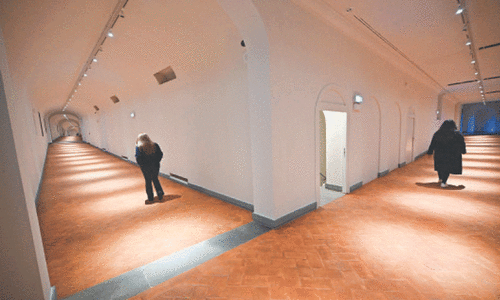LONDON, Jan 17: The world is inching closer to nuclear Armageddon, top scientists warned on Wednesday while moving a symbolic Doomsday Clock nearer to midnight -- and stressing the growing threat of climate change.
Renowned British physicist Stephen Hawking was among the Nobel laureates behind the warning, which cited North Korea and Iran as particular reasons increasing the danger of a nuclear winter.
“It is now five minutes to midnight,” Hawking said after the clock was moved forward two minutes from 11:53 pm, where it had stood since 2002.
“We foresee great peril if governments and scientists don't take action now to render nuclear weapons obsolete and to prevent further climate change,” he added. The Bulletin of the Atomic Scientists has kept a Doomsday clock since 1947 as a reminder of the dangers of nuclear proliferation.
In simultaneous events in London and Washington on Wednesday the clock's big hand was pushed forward, its sixth move since the end of the Cold War with the collapse of the Soviet Union.
“We stand at the brink of a Second Nuclear Age. Not since the first atomic bombs were dropped on Hiroshima and Nagasaki has the world faced such perilous choices,” said the scientists in a statement.
“North Korea's recent test of a nuclear weapon, Iran's nuclear ambitions, a renewed emphasis on the military utility of nuclear weapons, the failure to adequately secure nuclear materials, and the continued presence of some 26,000 nuclear weapons in the United States and Russia are symptomatic of a failure to solve the problems posed by the most destructive technology on Earth.” First set at seven minutes to midnight -- a phrase that has become part of pop culture -- the clock has been moved 17 times in response to global events, varying from two minutes to midnight in 1953 to 17 minutes to midnight in 1991.
The most recent shift was in 2002 when it moved two minutes forward because the United States withdrew from the Anti-Ballistic Missile Treaty and terrorists were known to be seeking nuclear and biological weapons.
Founded in 1945 by scientists who had helped develop the atomic bomb and were deeply concerned about the use of nuclear weapons, the Bulletin of the Atomic Scientists counts 17 Nobel laureates among its boards of directors and sponsors.
The London event was held at the Royal Society, Britain's top scientific institution, whose president Martin Rees joined in stressing the threat of climate change as well as nuclear proliferation.
“Nuclear weapons still pose the most catastrophic and immediate threat to humanity, but climate change and emerging technologies in the life sciences also have the potential to end civilization as we know it,” he said.—AFP














































Dear visitor, the comments section is undergoing an overhaul and will return soon.